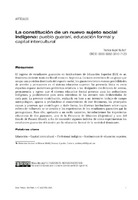La constitución de un nuevo sujeto social indígena : pueblo guaraní, educación formal y capital intercultural
The constitution of a new indigenous social subject : guarani people, formal education and intercultural capital
Abstract
El ingreso de estudiantes guaraníes en Instituciones de Educación Superior (IES) es un fenómeno reciente tanto en Brasil como en Argentina. En tanto miembros de un grupo que ocupa una posición dominada del espacio social, los guaraníes tienen escasas posibilidades de acceder y permanecer en el sistema educativo superior. Su presencia física en estos espacios expone numerosos problemas relativos a las desiguales condiciones de acceso, permanencia y egreso que el sistema educativo formal presenta para las poblaciones indígenas, y posiblemente para otros miembros de los sectores más desheredados de cada país. La presente contribución, realizada en base a un intensivo trabajo de campo antropológico, apunta a profundizar el conocimiento de este fenómeno, las principales causas y procesos que contribuyen a darle forma, las diversas instituciones sobre cuyas esferas de influencia se ve atraído y las experiencias de los estudiantes guaraníes que lo protagonizan. Para ello, apelando a un estilo narrativo, introduciremos las trayectorias educativas de dos guaraníes, uno de la Provincia de Misiones (Argentina) y uno del Estado de Paraná (Brasil), a fin de transmitir algunos indicios de cómo experimentan los estudiantes guaraníes el tránsito por la educación formal de la sociedad dominante. Guarani students ́ access to Higher Education Institutions (HEI) is a recent phenomenon both in Brazil and Argentina. As members of a group which occupy a dominated position in social space, Guarani people have scarce possibilities of accessing and remaining in the higher education system. Their presence in such places expose numerous issues related to the unequal conditions of access, permanence and completion that the formal education system pose for indigenous populations, and possibly for members of other disinherited social groups in both countries. Based on an intense anthropological fieldwork, this paper aims to further increase our knowledge of this phenomenon, taking into account the experiences of the Guarani students that play a leading role in it, as well as the different institutions engaged throughout the process. By making use of a narrative style, educational trajectories of two Guarani students are presented, one from the province of Misiones (Argentina) and the other from the State of Paraná (Brazil), in order to convey some signs of how Guarani students experience the passage through the formal education system of the dominant society.
Collections
The following license files are associated with this item:



